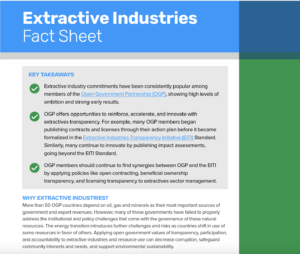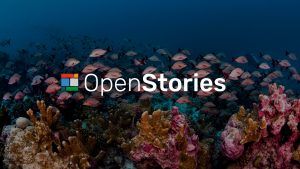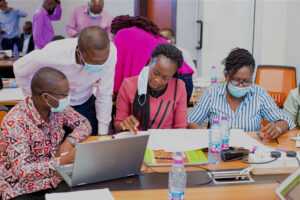- Extractive Industries Fact Sheet 2023
Extractive industry commitments have been consistently popular among members of the Open Government Partnership (OGP), showing high levels of ambition…
2023, Document, PDF
- Extractive Industries Fact Sheet
A look at global progress and member-level examples of applying open government principles to the extractive industries
2021, Document, PDF
- Gender and Extractive Governance: Lessons from Existing Legal and Policy Frameworks
Women and gender minorities often face disproportionate harms from oil, gas and mineral extraction and are likely to access economic…
2021, Outbound Link, Web Page
- Using the EITI Standard to Combat Corruption: Lessons From Transparency International's Mining Research in Five Countries
The oil, gas and mining sectors are some of the world’s most corruption-prone industries. The renewed focus on combatting corruption…
2020, Outbound Link, Web Page
- Transparency International's Accountable Mining Resources
Transparency International’s Accountable Mining programme is developing a series of ‘maps’ to demystify the licensing process in countries around the…
2020, Outbound Link, Web Page
- Seeking Synergy: OGP & EITI
This paper explores how OGP and EITI members can leverage both platforms to make meaningful reforms in the extractives industry,…
2019, Research Product, Web Page
- Closing the Gap: Strengthening the Development and Implementation of Natural Resource Commitments in OGP
This report focuses on the implementation of natural resource commitments for better development and open government outcomes.
2019, Document, PDF
- Disclosing Environmental Information in the Natural Resource Sector (English)
This issue brief is a product of collaboration between the OGP Openness in Natural Resources Working Group and its co-anchors:…
2019, Document, PDF
- Guidance Notes on the EITI Standard
The following guidance notes, standard terms of reference and templates have been issued by the EITI International Secretariat to provide…
2018, Outbound Link, Web Page
- Disclosing Beneficial Ownership Information in the Natural Resource Sector (French)
This issue brief is a product of collaboration between the OGP Openness in Natural Resources Working Group and its co-anchors:…
2017, Document, PDF
- Disclosing Contracts in the Natural Resource Sector (English)
This issue brief is a product of collaboration between the OGP Openness in Natural Resources Working Group and its co-anchors:…
2017, Document, PDF
- Resource Governance Index (NRGI)
The 2017 Resource Governance Index, gathered by the Natural Resource Governance Institute (NRGI), measures the quality of governance in the…
2017, Outbound Link, Web Page
- Environmental Democracy Index (WRI)
This is an archived site that was created in 2015 through the research of WRI and its partners to show…
2015, Outbound Link, Web Page
- NRGI Primers: A Series About Resource Governance
The Natural Resource Governance Institute (NRGI) has created a series of short, illustrated overviews of key topics in their portfolio…
2015, Outbound Link, Web Page
- How to Read and Understand Mining Contracts
This resource from NRGI and EITI highlights strong contract clauses and explore how others could be improved.
2014, Outbound Link, Web Page
- Oil Contracts: How to Read and Understand Them
In late October 2012, OpenOil gathered a group of world class oil experts and professionals to jointly write a book…
2012, Outbound Link, Web Page
- Disclosing Beneficial Ownership Information in the Natural Resource Sector (English)
, Outbound Link, Web Page
- The EITI Standard
Explore the Extractive Industries Transparency Initiative's (EITI) guide to implementing the EITI Standard.
, Outbound Link, Web Page
- The Open Contracting Data Standard
The Open Contracting Data Standard (OCDS), is a free, non-proprietary open data standard for public contracting, implemented by over 30…
, Outbound Link, Web Page








